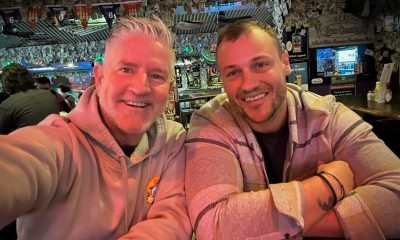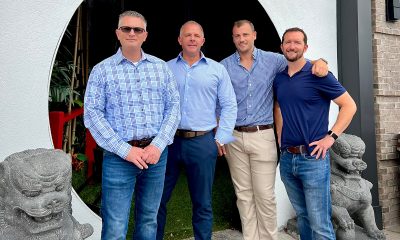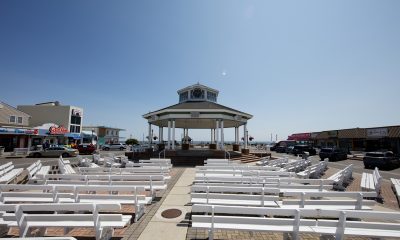Sports
Slugger’s journey to coming out
Former Orioles minor league all-star Tyler Townsend on life in baseball’s closet and finding redemption in helping others
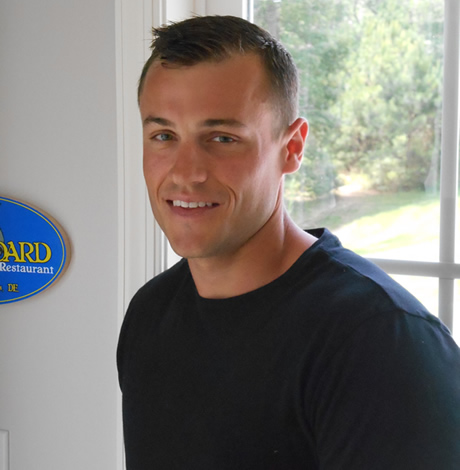
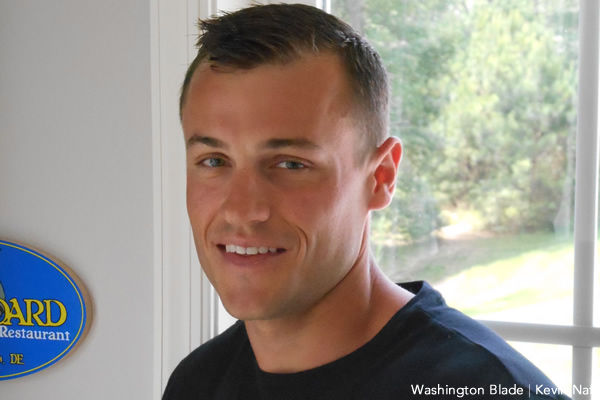
Today, Tyler Townsend has left baseball behind and is pursuing a degree in hospitality management. (Blade photo by Kevin Naff)
If not for a recurring hamstring injury, Tyler Townsend just might have become Major League Baseball’s first openly gay player.
Townsend, now 27, was drafted by the Baltimore Orioles in 2010 in the third round, opted out of his senior year at Florida International University and entered the minor league system.
An all-star first baseman, he quickly progressed through the system, playing stints in Aberdeen, Frederick and Salisbury, all within the Orioles operation. And through three years of minor league ball, Townsend played from the closet, keeping his sexual orientation a secret from teammates, coaches — and the female fans who followed the team and offered phone numbers to players.
“I was afraid of what would be said by teammates and fans,” he said in an interview with the Blade from his home in Rehoboth Beach, Del. “I always had a goal of getting to professional baseball since I realized I had the ability to do it and I just didn’t want anything to take away from that. I didn’t want the person who didn’t understand it to not give me a chance because they didn’t want to deal with my personal life. That was my fear. And there wasn’t anybody to look up to who was out playing sports.”
Despite his apprehension, Townsend said his plan all along was to delay coming out publicly until he made it to the big leagues.
“I would have come out if I’d made it to the pros,” he said, with a hint of regret.
For someone coming out publicly in the media for the first time, Townsend is relaxed and poised, reclining slightly in the well-appointed living room of the townhouse he shares with his partner not far from Rehoboth’s beaches.
His story rings familiar to legions of gay people who are — or were — out in their personal lives, but closeted at work. He had a boyfriend and lived in D.C. when not on the road, living an openly gay life, though he didn’t frequent gay bars. But when it was time to play ball, Townsend dodged questions about his sexual orientation — and why he never called those women who hit on him. His boyfriend at the time, who was older, attended games as his “uncle.”
“I was out in the off-season, so six months of the year I was happy and out and being myself and once spring training came around it was back in the closet,” he said. “I should have done things differently but I feel like telling this story now makes up for it a little bit.”
Townsend, like so many American boys, started playing baseball at age 10, joining a Delaware travel team and continuing through his high school years at Cape Henlopen High outside of Rehoboth, where he grew up. Rehoboth is a popular beach destination for gays from Baltimore, D.C. and Philadelphia, so Townsend was no stranger to the sight of two men holding hands.
“I always knew I was gay,” he said. “And growing up in Rehoboth, I knew what gay was. Once I realized I was attracted to other guys, I knew right away what it was.”
After earning a college scholarship and playing three years for Florida International, Townsend realized every little league player’s dream.
“To hear your name on TV on draft day is one of the best memories, it’s what I worked for my whole life,” he said. “Nothing else mattered.”
But the euphoria of that moment soon gave way to the harsh realities of a career in pro sports — long stints away from home, injuries and, for Townsend, the pressure of guarding his secret. After being drafted by the Orioles and signing his contract, Townsend played advanced rookie ball in Aberdeen, Md., then went to Pensacola, Fla., for training in the off season. That’s when he first tore his hamstring doing sprints, which led to continuous struggles with injury.
That’s also when he decided to start the coming out process by telling his family.
“I just couldn’t live with it anymore,” he said. “I thought the whole world was going to be against me. I couldn’t live with the lie anymore so I decided to tell my family and that was it.”
His family, which includes his mother of Lewes, Del., father of Georgetown, Del., a sister, half brother and half sister, proved supportive and accepting. “I was in Miami when I told my Dad and he got in the car and drove down to make sure I was OK.”
Locker room epithets
The acceptance he found off the field didn’t translate to the locker room, where homophobic epithets were commonplace and where he feared coming out would doom his chances of playing in the big leagues.
“So many times, I heard homophobic remarks in locker rooms but didn’t say anything because if I get to the position where they’re going to call me up and it’s between me and somebody else, I didn’t want the person making the decision saying, ‘I don’t want to deal with the publicity or the discomfort of other players,’” he said. “I didn’t want anything to hinder my chances and being openly gay would have hurt.”
He recalled one teammate who was religious and read the Bible every day, who told Townsend there’s nothing wrong with being gay as long as you don’t act on it. Another time, he said a coach called a player a faggot because he touched his belt. And at spring training in Florida, Townsend said an older gay man would often come to games and bring bubble gum and snacks for the players. On his birthday one year, the coaches joked about taking a video of the team in the shower and giving it to the man as a gift.
“Little things like that always made me realize there was no room for an openly gay player,” Townsend said. “If they’re that uncomfortable with the idea of someone being gay, what would their reaction be if they actually had to take a shower or change or play or trust someone on their team who’s gay?”
As a result, he never came out to anyone on the team, though one locker room incident brought him close. There was a man in North Carolina, Townsend said, who would sneak into locker rooms and impersonate cleaning staff while spying on players getting undressed. When someone finally caught on and kicked him out, the mood in the locker room turned angry, with players using anti-gay epithets and threatening to beat the man. According to Townsend, one player said, “I don’t care how close I am to somebody if I ever found out they were gay I would disown them.”
The threats of physical violence prompted Townsend to speak up, challenging his teammates, who demanded to know why he was defending the trespasser.
“I told them they were doing something stupid — it was the one time I spoke out,” he said. “People are ignorant and maybe it would have been different if I came out but I just felt that the majority of them had a preconceived notion of what all gay men are and it wouldn’t matter.”
After battling the hamstring injuries for most of his professional career, Townsend finally accepted that he needed a break in 2013.
“It was discouraging. It was one of the two toughest decisions I’ve had to make — leaving baseball and coming out.”
‘There’s still a lot of hatred’
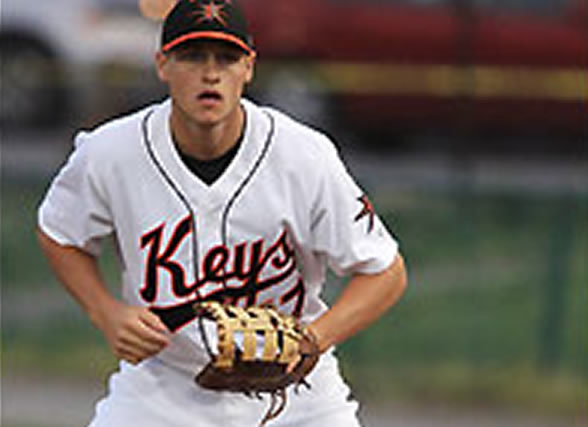
Tyler Townsend played in the minor league system after being drafted by the Baltimore Orioles in 2010. (Photo courtesy Frederick Keys)
Major League Baseball has never had an openly gay active player. The NBA had Jason Collins, who came out in 2013 and played briefly before retiring. The NFL had Michael Sam, who was drafted but failed to make a team and just last week quit the Canadian Football League, citing mental health issues. Publicly at least, Collins and Sam were heralded in the media and showered with attention — Oprah interviews, Sports Illustrated covers — all the trappings of a carefully orchestrated modern-day coming out story aimed at downplaying criticism and maximizing endorsement and speaking engagement potential. Anyone who tweeted their disgust with the newly out players was quickly reprimanded and the offending tweet deleted.
Just this week, David Denson, a minor league player with the Milwaukee Brewers system, came out as gay. He told the Milwaukee Journal Sentinel that his teammates on the Helena Brewers accept him. Maybe he’ll make it to the big leagues and become the first active out gay player, overcoming the skepticism of many observers who see baseball as the last frontier for gay athletes.
“Sports in general has that macho persona that you need to put out,” Townsend said. “Baseball is 85 percent players from conservative areas like Latin America and the Bible Belt and you have 18-year-old kids who’ve never been exposed to anything.”
The view that baseball will be the last major pro male team sport to have an out gay player is common among sports fans the Blade has spoken to about the subject. To help address the problem of homophobia in baseball, MLB hired gay retired player Billy Bean as its first “Ambassador of Inclusion.” Bean counseled Denson on coming out.
“The beauty of what could come from this is he can be an example that can help change that perception and change the stereotype that there would never be a gay person on a men’s professional sports team,” Bean told the Journal Sentinel. “That was something I struggled with.”
Townsend said he also turned to Bean for help with coming out publicly.
“Billy Bean has been a help, but he couldn’t come out either and it’s the same in 2010 as it was in the ‘80s,” he said. “ The locker room is a free-for-all, there’s still a lot of hatred and something needs to be done about it.”
So what’s to be done? Townsend cites sensitivity training for coaching staff as key, because younger players are emboldened when they hear coaches using homophobic epithets. The other solution, he says, is more out gays in the game. “We need someone like Jackie Robinson to break that barrier.”
Today, Townsend has mostly left baseball behind, though he recently played in a softball tournament. He’s resumed his studies at Florida International University, pursuing a degree in hospitality management. He works part-time as a bartender in Rehoboth and hopes to one day open a restaurant of his own.
He met his partner, David Gonce, a regional sales director for an information document managing company, about a year and a half ago in Dewey Beach, Del. The two exchanged glances at the Starboard, a bar and restaurant popular with the straight college crowd. But Gonce thought Townsend was checking out the female friend who was with him.
“I asked the waitress if he wanted to meet my buddy’s girlfriend and she said, ‘No, he’s gay and he’s looking at you.’”
They started dating shortly after and now, 18 months later, a plaque of the Starboard’s logo hangs in their living room.
“It’s got to be really difficult to suppress who you are in front of all these people you’ve gotten to know so well for such a long period of time playing baseball,” Gonce said. “I give him a lot of credit for doing that, it’s very difficult.”
Reflecting on his years in professional baseball and just how close he came to the majors, Townsend betrays some regret.
“It’s sad looking back now, I wish I could have been that person but I didn’t have the courage at the time,” he said. “That’s not right on my part … I would do it differently if I could. There’s that 16-year-old kid, I want him to know not to be scared and don’t let other people steer you away from who you are.”
He added that he’s still friends with some players on Facebook and isn’t sure how they’ll react to this interview but that he no longer cares.
“This is my way of letting the guilt go, so I’m doing this for me and for people who are struggling with the same things I struggled with to try to help them. My regret was not coming out sooner and being that role model for somebody but I still have the passion to help.”
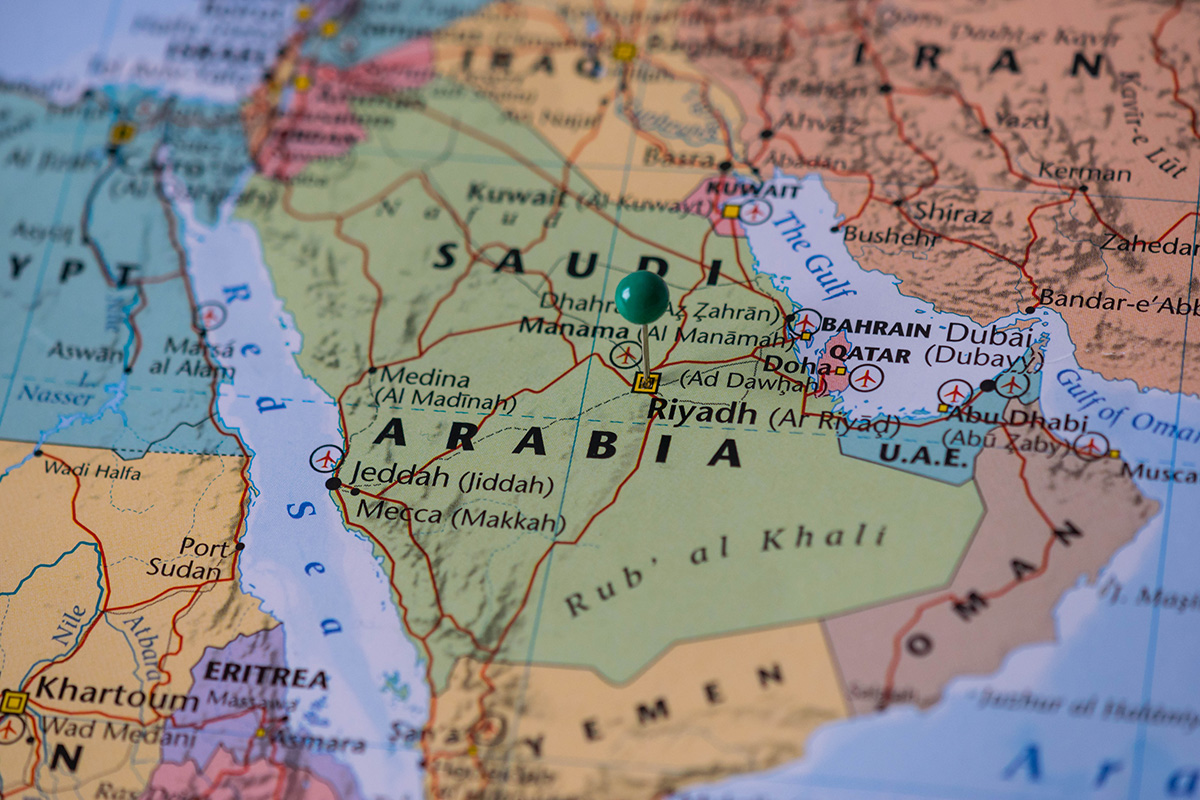
FIFA has announced Saudi Arabia will host the 2034 World Cup, despite concerns over its human rights record that includes the death penalty for homosexuality.
The Associated Press reported FIFA confirmed the decision on Dec. 18. The AP noted Saudi Arabia is the only country that bid to host the 2034 World Cup.
“This is a historic moment for Saudi Arabia and a dream come true for all our 32 million people who simply love the game,” said Sport Minister Prince Abdulaziz bin Turki Al- Faisal, who is also president of the Saudi Olympic and Paralympic Committee, in a statement the Saudi Press Agency posted to its website.
Saudi Arabia is among the handful of countries in which consensual same-sex sexual relations remain punishable by death.
A U.S. intelligence report concluded Saudi Crown Prince Mohammed bin Salman “likely approved” the murder of Jamal Khashoggi, a Washington Post columnist, inside the Saudi Consulate in Istanbul in 2018. A federal judge in 2022 dismissed a lawsuit against Prince Mohammed after the Biden-Harris administration said he was immune to the lawsuit because he is the country’s prime minister.
Human rights activists have also criticized the Saudi government over the treatment of women, migrant workers, and other groups in the country.
“No one should be surprised by this,” Cyd Zeigler, Jr., co-founder of Outsports.com, an LGBTQ sports website, told the Washington Blade in an email after FIFA confirmed Saudi Arabia will host the 2034 World Cup. “FIFA, the International Olympic Committee, and many other world governing bodies routinely turn to authoritarian countries with terrible human-rights records to host major sporting events. There are simply few other countries willing to spend the billions of dollars it takes to build the needed infrastructure.”
Peter Tatchell, a long-time LGBTQ activist from the U.K. who is director of the Peter Tatchell Foundation, in a statement described FIFA’s decision as “a betrayal of the values that football should stand for: Inclusivity, fairness, and respect for human rights.”
“This is not about football; it’s about sportswashing,” said Tatchell. “The Saudi regime is using the World Cup to launder its international image and distract from its brutal abuses. By granting them this platform, FIFA is complicit in whitewashing their crimes.”
Qatar, which borders Saudi Arabia, hosted the 2022 World Cup.
Consensual same-sex sexual relations remain criminalized in Qatar.
“Saudi Arabia was the only country to bid for the 2034 FIFA World Cup,” said Zeigler. “So, until FIFA, the IOC (International Olympic Committee) and other governing bodies ban major human-rights violators from hosting, we’ll continue to see events like this in Saudi Arabia, China, Qatar, and other countries with terrible LGBTQ rights issues.”
The Blade has reached out to FIFA and the Saudi government for comment.
Sports
Controversy grows over member of Calif. university’s women’s volleyball team
Coach suspended, NCAA sued, more rivals forfeit
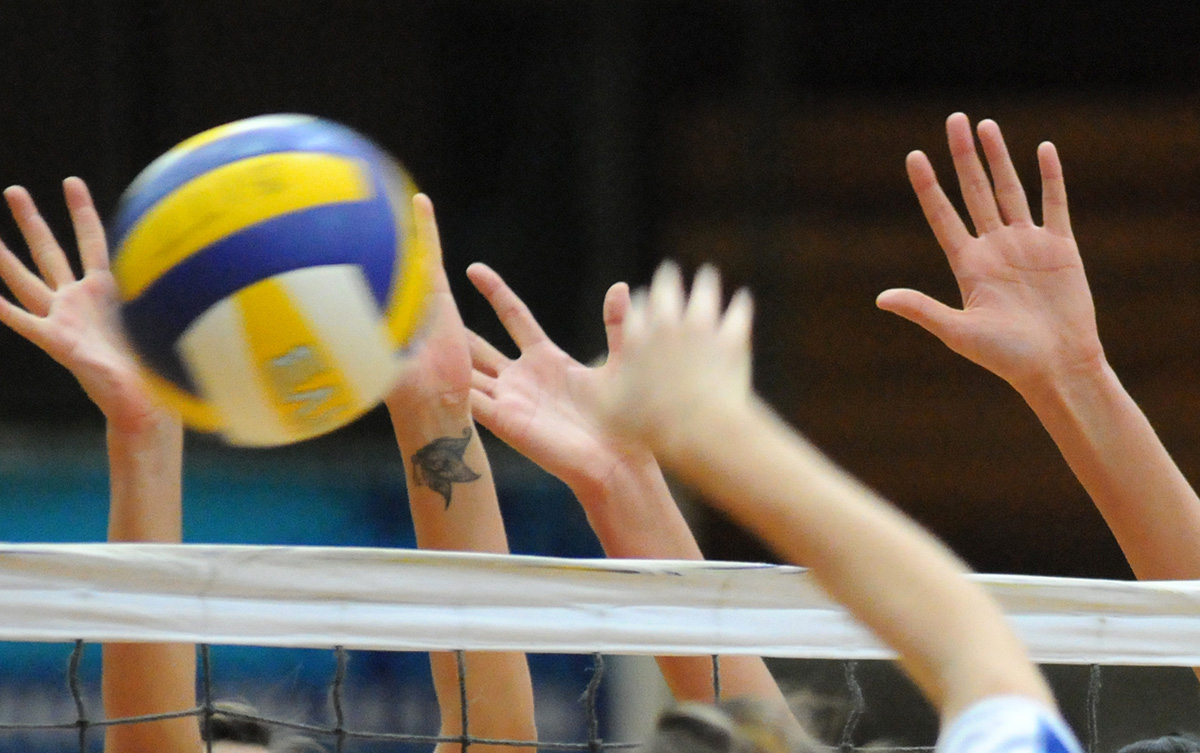
San Jose State University’s women volleyball team has collected yet another W by forfeit — its seventh so far this season — as controversy swirls around one player on its roster. She’s one of the seniors, and she has been dragged in the media by her own co-captain, who outed her as transgender.
The Washington Blade is not naming this student athlete since neither she nor the school have confirmed or even commented on her gender identity.
SJSU visited San Diego last weekend for a match before the Aztecs’ biggest home crowd of the season — including protesters waving “Save Women’s Sports” banners and booing one player on the Spartans team in particular: The woman who is reported to be trans.
Security was tight, with metal detectors and extra guards and police officers present. Video posted to YouTube by a right-wing sports media site — which names the player — shows an angry fan arguing with security about his First Amendment rights.
Video recorded during Nov. 9’s game shows a player for San Diego was injured following a spike by the player rumored to be trans, and had to be helped off the court. However, the video clearly shows that player was injured by landing poorly on one foot, not as a result of the spike.
The Aztecs defeated the Spartans 3-1, but San Jose has still punched its ticket to the conference finals, thanks to its record number of forfeits.
Wyoming was set to visit SJSU Thursday, but for the second time is joining other universities that have forfeited games against the Spartans, all without providing a reason. Boise State announced it will forfeit an upcoming match set for Nov. 21, its second forfeit against SJSU.
In September, the Spartans’ co-captain, senior Brooke Slusser, outed her own teammate, the player at the center of this controversy, in joining a federal lawsuit against the NCAA spearheaded by anti-trans inclusion activist and former college athlete Riley Gaines.
Slusser said in the lawsuit and in subsequent interviews that the player in question shouldn’t be on her team. The suit claims the NCAA’s policy on trans athletes violates Title IX by allowing “men” to compete in women’s sports and use women’s locker rooms where they display “full male genitalia.”
The NCAA policy for trans athletes participating in women’s volleyball aligns with that of USA Volleyball, which requires trans female athletes to suppress their testosterone below 10 nmol/L for a period of one year before competition. That is also how the NCAA determines eligibility. SJSU has stated repeatedly that all its players are eligible.
The lawsuit also asks the NCAA to revoke any titles or records won by trans female athletes in women’s competitions, which seems to be specifically aimed at stripping out trans NCAA champions Lia Thomas and CeCé Telfer of their titles in swimming and track and field, respectively.
Prior to this season, the player rumored to be trans did not attract any attention other than being a successful starter, like Slusser. But now that she is in the media spotlight, Slusser has come forward to tell right wing media, including Megyn Kelly, why she feels another woman two inches taller than she is poses a danger.
“I don’t feel safe,” Slusser said on “The Megyn Kelly Show” last month. “I’ve gone to my coaches and said I refuse to play against [her] … It’s not safe.”
In the video, both Kelly and Slusser refer to the player as “him” and a “man,” and name her.
Now comes another twist: San Jose State University suspended associate head coach Melissa Batie-Smoose with pay, indefinitely, after she filed a Title IX complaint against SJSU. She claims the player Slusser identified as trans conspired with an opponent to help the team lose a match and injure Slusser. Batie-Smoose named the player in question in her complaint and on Sept. 23, joined the same lawsuit that Slusser is now a part of.
“Safety is being taken away from women,” Batie-Smoose told Fox News. “Fair play is taken away from women. We need more and more people to do this and fight this fight because women’s sports, as we know it right now will be forever changed.”
Media reporting on the suspension, including Fox News, continue to name the athlete in question, with some also reporting what they say is the athlete’s birth name.
San Jose State released a statement following the suspension of Batie-Smoose: “The associate head coach of the San Jose State University women’s volleyball team is not with the team at this time, and we will not provide further information on this matter,” the team said.
SJSU Coach Todd Kress told ESPN that reports saying that any member of the Spartans colluded with their opponent are “littered with lies.”
The Spartans are currently among the top six finishers in the Mountain West Conference that will qualify to compete in the conference tournament scheduled for Nov. 27-30.
Sports
University of Nevada forfeits game rather than play possible trans athlete
Women’s volleyball team cites ‘not enough players to compete’
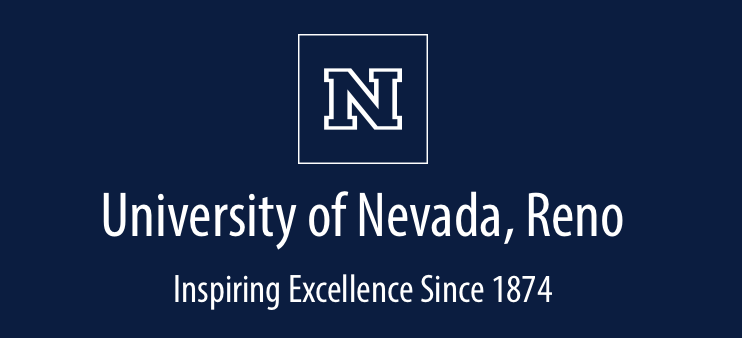
For the fifth time, a women’s volleyball team has chosen to forfeit instead of play against San Jose State University, because of rumors that one of its players is a transgender woman.
The University of Nevada, Reno, officially announced on Friday that it would forfeit Saturday’s game against the SJSU Spartans. This followed an announcement by Wolf Pack players who said they “refuse to participate in any match that advances injustice against female athletes,” without providing further details.
Originally, Nevada’s athletic department had said the program would not back out from the match, citing state equality laws, but also said that no players would be disciplined if they chose to not participate.
“The vast majority of our team decided this is something we wanted to take a stand on,” Nevada team captain Sia Liilii told Fox News. “We didn’t want to play against a male player.”
“In all of our team meetings it just kept coming back to the fact that men do not belong in women’s sports. If you’re born a biological male, you don’t belong in women’s sports. It’s not even about this individual athlete. It’s about fair competition and safety for everyone.”
Outsports and several conservative and right-wing websites have identified the player who is rumored to be trans, but the Washington Blade has opted to not do so since she herself has not come forward to either acknowledge or deny she is trans.
As ESPN reported, Nevada follows Southern Utah, Boise State, Wyoming, and Utah State in canceling games against the Spartans. Boise State, Wyoming, Utah State, and Nevada are all members of the Mountain West Conference, so those contests are considered forfeits and count as valuable wins in the league standings for San Jose State.
Riley Gaines, the anti-trans inclusion activist for the Independent Women’s Forum has joined the chorus in claiming the Spartans’ roster includes a trans woman.
If you're wondering why teams are forfeiting against @SJSU, here's the reason.
Last night another woman was smashed in the face by a kill from a man posing as a woman.
It's unfair, unsafe, and regressive, yet our "leaders" remain silent. pic.twitter.com/OS15AFxQsp
— Riley Gaines (@Riley_Gaines_) October 18, 2024
Despite this, neither San Jose State nor any of the other forfeiting teams have said the university’s women’s volleyball team has a trans player. SJSU issued a statement defending its roster.
“Our athletes all comply with NCAA and Mountain West Conference policies and they are eligible to play under the rules of those organizations. We will continue to take measures to prioritize the health and safety of our students while they pursue their earned opportunities to compete,” the statement read.
The governors of Idaho, Nevada, Utah, and Wyoming — all of whom are members of the Republican Party — have issued public statements supporting the cancellations, claiming it’s in the interest of fairness in women’s sports. This week, Donald Trump, the GOP presidential nominee and former president, spoke at a Fox News televised town hall when asked about trans athletes in women’s sports.
“We’re not going to let it happen,” Trump said. “We stop it, we stop it, we absolutely stop it. We can’t have it. You just ban it. The president bans it. You don’t let it happen. It’s not a big deal.”
-

 Federal Government3 days ago
Federal Government3 days agoHHS to retire 988 crisis lifeline for LGBTQ youth
-

 Opinions3 days ago
Opinions3 days agoDavid Hogg’s arrogant, self-indulgent stunt
-

 District of Columbia3 days ago
District of Columbia3 days agoD.C. police seek help in identifying suspect in anti-gay threats case
-

 Virginia3 days ago
Virginia3 days agoGay talk show host wins GOP nom for Va. lieutenant guv

